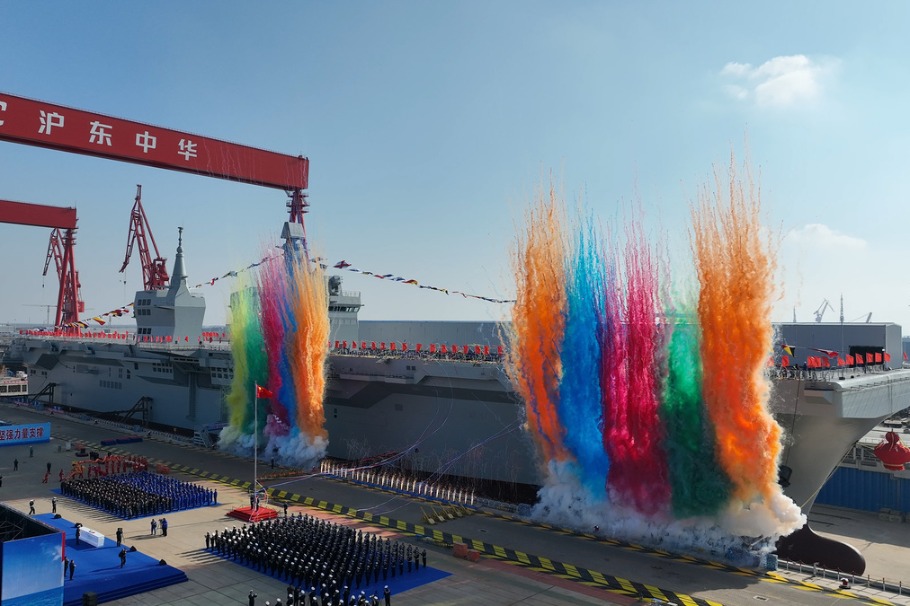US must stop geopolitical games in Afghanistan


I still remember US officials and political pundits gathered at a Stanford University seminar in 2004 talking about the rare opportunity the United States had to transform Afghanistan into post-war Japan or Germany.
That delusion came to an end on Tuesday as the US withdrew its last soldier from the country that it invaded in 2001 to avenge the Sept 11, 2001, terrorist attacks. The troop withdrawal signals a clear defeat for the US-led allies because the Taliban government they toppled by force two decades ago are now back in power.
Baktash Ahadi, a former combat interpreter who served alongside US and Afghan forces, wrote in The Washington Post on Tuesday that, comparing the Taliban with the US and its allies, the vast majority of Afghans have always viewed the Taliban as the lesser of two evils. That must have come as a shock to most people in the US and other NATO countries who believe the US-led forces were "angels" despite the huge mess they have left behind in Afghanistan.
For the Afghans who have fought foreign invaders for centuries, this is a proud moment, a moment to celebrate independence from foreign occupation.
The challenges facing Afghanistan are enormous, not least because some 40 percent of its GDP comes from international aid. The US froze billions of dollars of the Afghan government's reserves last month. Under US pressure, the World Bank and the International Monetary Fund, too, froze the funds allocated for the country. And the European Union has cut off development funding and government assistance to the country.
All these, plus the existing US sanctions against the Taliban, will make the country's sociopolitical transition more difficult under the Taliban's rule.
UN Secretary General Antonio Guterres said on Wednesday that a humanitarian catastrophe looms in Afghanistan, emphasizing that almost half of the country's population needs humanitarian assistance, and one in three Afghans don't know where their next meal will come from.
Regrettably, despite occupying the country for almost 20 years, the foreign powers failed to rebuild the Afghan economy, let alone developing Afghanistan into a country resembling postwar Japan or Germany.
The debate on whether the war and the chaotic troop pullout are a grand failure or "extraordinary success" will likely continue. And there are legitimate concerns whether a Taliban-led coalition will live up to the expectations of the Afghan people and the international community despite the Taliban pledging to not ban female education or curtail certain rights of women, or seek revenge.
The most important thing the international community needs to do now is to help address the humanitarian crisis and facilitate the rebuilding of the Afghan economy instead of making it more difficult for the new government to function.
Some sinister Western politicians are worried that China may seize this opportunity to further extend the Belt and Road Initiative into Afghanistan. If that's their concern, I welcome their governments and companies to join the efforts to build roads, bridges, power grids and other infrastructure facilities, and industries in Afghanistan.
As a next door neighbor, China's interest lies in helping Afghanistan become a peaceful, stable and prosperous country, one that is free from terrorist organizations and foreign invasion. That should also be the goal of the entire international community.
In his Tuesday speech, US President Joe Biden tried to deflect the public criticism for the chaotic pullout of US troops from Afghanistan by saying that China and Russia wanted nothing more than for the US to be bogged down in Afghanistan for another 10 years. That's not true, for China has always opposed the US-led invasion and occupation of the country.
This is not the time to intensify the geopolitical game in Afghanistan, but the time to help rebuild the country. The rebuilding may not be perfect. And Afghanistan may not become like post-war Japan or Germany. But international support is vital to the future of Afghanistan now that it is free of foreign occupation.
The author is chief of China Daily EU Bureau based in Brussels.


































